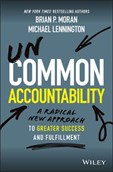- Behaviour
Accountability for the Good and Bad
New book shows how ‘accountability’ in its true sense can unlock personal and team performance
Unfortunately, this weighty word has been misappropriated, and is now only ever seen in a negative light—applying to misdeeds but not to their opposite. While we say a football manager should be ‘held accountable’ for losses, when the team is riding high, we do not say he or she should be ‘held accountable’ for the success. The OED defines ‘accountable’ as: i) responsible for someone or some action; answerable. ii) able to be explained. Nothing bad is implied. Yet being ‘called to account’ has a very negative ring.

In their new book, Uncommon Accountability, Brian P. Moran and Michael Lennington, principals at the change management consultancy The Execution Company, look at the true meaning of this important word, arguing that ownership of one's choices and the discipline to act effectively on these choices is at the heart of accountability. Whether the result of any action is a success or a failure is not the point. The danger with the word used, as it typically is, in a negative sense is that it discourages productive actions by causing undue wariness, low self-belief and a lack of trust that we can achieve our goals. It promotes a fear of failure.
Though the book is subtitled ‘A Radical New Approach to Greater Success and Fulfillment’, it is perhaps not so much ‘new’ as a return to the old original understanding of accountability that can bring these greater qualities. The core message presented here is that applied in its fullest sense accountability—for good and bad—can be a prime motivator and driver of human enterprise and an essential characteristic of good leadership. And that establishing accountability in its true sense in teams and across organizations has the potential to lift employee engagement and transform performance.
At its core the book emphasizes the vital importance of personal choice in every interaction. It accentuates the positive aspect of accountability and explains how it can be used to foster a growth and learning mindset, while discouraging feelings of victimhood, stress and negativity. It shows how individuals and teams that take ownership of their decisions, actions and roles can outperform those that have a traditional employee mindset, stating that: “Employees work to the core job description; owners work to deliver their best results and live the mission.”
The authors consider the concept of behavioural consequences—looking at positive and negative reinforcement, punishment and penalty—and show how best to manage negative consequences by “holding others capable” and avoiding the blame game. A leader that manages by citing consequences is likely to only get the minimum effort form their team—or themselves. The focus should instead be on ensuring everyone is encouraged and supported to achieve what they are ‘capable’ of. Consequences, they argue, are not bad—they help shape behavior—but crucially: “consequences are not, and never will be, ‘accountability’.”
Rich in real-world case studies, that explore the principles of Uncommon Accountability put into practice, the book takes what appears to be a simple idea and develops it into a surprisingly comprehensive tool for unlocking personal and team potential and driving performance.
……………………………………………………………………………………………………………
ARTICLES YOU MIGHT LIKE
BOOK REVIEW
An authoritative antidote to executive stress, overwhelm, and burnout
DEVELOPING LEADERS QUARTERLY MAGAZINE AND WEEKLY BRIEFING EMAILS

































